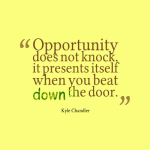When you’re in a management role, you receive inquiries for employment on a daily basis. Heck, sometimes it’s on an hourly basis. Job seekers have many different approaches and strategies for getting the attention of a hiring manager, and depending on the style of the individual who’s making the decision, it may or may not work.
I’ve often been asked for feedback on what to submit on a demo, how to craft an email, and who to reach out to when chasing opportunities and I usually tell each person that there’s no particular formula and the results will vary. Some programmers prefer longer demos that are unedited. Others like shorter “best of” clips that get right to the point. One executive wants a quick one paragraph introduction, and the other prefers a cover letter, resume, references and extensive details about your background.
 These are important factors to remember when you’re pursuing an opportunity. All that matters is finding that one person and company who’s willing to give you a shot. Don’t take the rejections personally. Sometimes openings don’t exist, the fit isn’t there, or a manager doesn’t like you or believe in you. You can waste a lot of energy wondering why you’re not getting the nod, but that’s valuable time you could be spending on chasing the next situation.
These are important factors to remember when you’re pursuing an opportunity. All that matters is finding that one person and company who’s willing to give you a shot. Don’t take the rejections personally. Sometimes openings don’t exist, the fit isn’t there, or a manager doesn’t like you or believe in you. You can waste a lot of energy wondering why you’re not getting the nod, but that’s valuable time you could be spending on chasing the next situation.
It’s well documented that Michael Jordan didn’t make his High School basketball team, Tom Brady was drafted in the 6th round, and 24 players went ahead of Mike Trout in the 2009 MLB Draft. I think they all turned out alright. If you prefer an industry example, watch this video of Adam Schefter talking about his climb up the ladder. If the top NFL Insider in our industry had to go through tough moments, you likely will too.
There is though one misunderstanding that I do want to address. A number of young people today are of the belief that by going to college and pursuing a broadcasting or journalism degree, it will open up the door for landing an opportunity.
Newsflash – it doesn’t!
 Yes education is important, and a degree has great value, but if you think you’re going to land a job on the air with an established radio station or produce one of their top shows simply because you went to college, received your degree, worked at the campus radio station, and are smart and love sports, prepare to be disappointed.
Yes education is important, and a degree has great value, but if you think you’re going to land a job on the air with an established radio station or produce one of their top shows simply because you went to college, received your degree, worked at the campus radio station, and are smart and love sports, prepare to be disappointed.
What a degree often does is help you get inside the building. But so does going to a broadcasting school, having a relationship in the industry, or knocking on the door and refusing to take no for an answer. It’s what you do once you’re in the building that determines whether or not you stick around and get a bigger break.
One person who has a great read on this subject is Matt Sammon, the Tampa Bay Lightning’s Director of Broadcasting and Programming. As you’d expect, working for a sports franchise attracts a lot of interest and Matt deals with it on a regular basis. There are certain things a college student or young person can do to stand out when trying to get their foot in the door and Matt’s taken the time to share his advice on the best ways to do it.
That Degree Alone Won’t Get You a Job in Sports Broadcasting
If you’re one of the handful of people who have followed my blog, you know I’m willing to offer advice to aspiring young broadcasters any day. You also know I’ve been very vocal in the past with some less than prepared intern candidates not once, but twice. Well I’m glad to say after a recent intern fair at Amalie Arena, the intern candidates were well-dressed and I even got a few samples of the lost art of a cover letter.
But with some candidates, I saw an issue I’ve seen not just in recent years, but one that has been around for as long as I can remember. A candidate is months away from graduating, and is solely counting on his or her degree to land a job. It doesn’t work that way, but I’m happy to provide some direction for you.
That Degree Is Valuable
 Don’t get me wrong, there is a value to having a college degree or even a broadcasting school certification. That piece of paper shows you were instructed on the basics, and I can tell you some things I picked up in college 20 years ago are still utilized today. Having a degree or certification from a reputable school can help you get a foot in the door, but make sure you have a major that puts you right in front of that door, and a minor that you can either “fall back” on or supplement that major degree.
Don’t get me wrong, there is a value to having a college degree or even a broadcasting school certification. That piece of paper shows you were instructed on the basics, and I can tell you some things I picked up in college 20 years ago are still utilized today. Having a degree or certification from a reputable school can help you get a foot in the door, but make sure you have a major that puts you right in front of that door, and a minor that you can either “fall back” on or supplement that major degree.
I majored in broadcast communications, and minored in management, and thankfully that education paid off to where I’m in both fields. But if I ever needed to do something other than manage in broadcasting, or if I ever needed to do some management outside of broadcasting, I have the documentation that says I can do that. But more importantly, I have experience, and THAT is the key to accelerating your career.
ANY Experience Helps
 I know what you’re saying college students, “I don’t have 20 years of experience!” Guess what, when I was starting out, neither did I! But believe it or not, I didn’t just stay out late and sleep in late while I was in college (please believe it). I worked, and even though the broadcasting business has changed since I went to college, there are still opportunities out there. It’s hard to balance a school schedule and a work schedule, especially when a lot of that work falls in to the “volunteer” category, but nothing brings me down more than a college senior with absolutely no experience looking for that internship in the final semester. And I can tell you, I’m not the only person in this position who feels the same. Yes, the internship is the big link between college and the real world, but you can’t come in totally cold.
I know what you’re saying college students, “I don’t have 20 years of experience!” Guess what, when I was starting out, neither did I! But believe it or not, I didn’t just stay out late and sleep in late while I was in college (please believe it). I worked, and even though the broadcasting business has changed since I went to college, there are still opportunities out there. It’s hard to balance a school schedule and a work schedule, especially when a lot of that work falls in to the “volunteer” category, but nothing brings me down more than a college senior with absolutely no experience looking for that internship in the final semester. And I can tell you, I’m not the only person in this position who feels the same. Yes, the internship is the big link between college and the real world, but you can’t come in totally cold.
We All Are Fans of Sports, But You Need More Than That
 Some of us are fans of the team we’re working for. But simply knowing a lot about our favorite team or favorite sport didn’t clinch the job. Knowledge of a particular sport or team you want to work for is helpful, but experience in any form of journalism or broadcasting trumps that. The encyclopedia-like memory, or collection of team memorabilia, is the icing on the cake if you can convince us you can carry out the simple tasks the job demands.
Some of us are fans of the team we’re working for. But simply knowing a lot about our favorite team or favorite sport didn’t clinch the job. Knowledge of a particular sport or team you want to work for is helpful, but experience in any form of journalism or broadcasting trumps that. The encyclopedia-like memory, or collection of team memorabilia, is the icing on the cake if you can convince us you can carry out the simple tasks the job demands.
Utilize Your School’s Resources
 You (or your parents) are paying a ton of money for you to attend that reputable school. You (and not likely your parents) will be paying off student loans out the wazoo for the next 20 years of your life. While you’re in school, use those facilities you’re paying for and will continue to pay for. If you want to get into broadcasting, sign up to work at the student radio station or TV station. If you’re into print journalism, sign up to work at the student newspaper or yearbook. Yes, these are “old school” mediums in a digital age, but a lot of schools have made the shift to digital while continuing to teach the journalism basics that are sorely lacking from a lot of what’s out there on the digital playground.
You (or your parents) are paying a ton of money for you to attend that reputable school. You (and not likely your parents) will be paying off student loans out the wazoo for the next 20 years of your life. While you’re in school, use those facilities you’re paying for and will continue to pay for. If you want to get into broadcasting, sign up to work at the student radio station or TV station. If you’re into print journalism, sign up to work at the student newspaper or yearbook. Yes, these are “old school” mediums in a digital age, but a lot of schools have made the shift to digital while continuing to teach the journalism basics that are sorely lacking from a lot of what’s out there on the digital playground.
The shift at the radio station will suck (my first shift was Sunday mornings from 1-6 a.m.). You’re going to be pulling cable at the TV station, and you’re going to get the less-than-desirable assignment for the newspaper. Take it. Take it and ask for more. This is where you’re going to learn, where you’ll make mistakes, where you’ll find your style and personality. Don’t turn down any opportunity, even if it’s unpaid or “just” for credit.
The Earlier You Start, The Better
 While this was titled for the class of 2016, it’s better suited for 2017 and beyond. One reason why I chose the University of Alabama for my college experience, was that I could work at the student radio station as soon as I got there (and as long as I maintained a good GPA which wasn’t an issue). You will learn a lot working for the school, but nothing replaces that real-world experience of an internship, which most are done for college credit. As soon as you make that fateful decision to go in to broadcasting (God bless you), check with your adviser on how the school does internships and how soon you can get one.
While this was titled for the class of 2016, it’s better suited for 2017 and beyond. One reason why I chose the University of Alabama for my college experience, was that I could work at the student radio station as soon as I got there (and as long as I maintained a good GPA which wasn’t an issue). You will learn a lot working for the school, but nothing replaces that real-world experience of an internship, which most are done for college credit. As soon as you make that fateful decision to go in to broadcasting (God bless you), check with your adviser on how the school does internships and how soon you can get one.
I was fortunate to work an internship the summer after my freshman year, and again the summer after my sophomore year. The second internship lasted 2 weeks before the station decided to hire me part-time. Those two summers prepared me to do some of my finest work at the school in my junior and senior years, preparing me to enter that real-world job search during my senior year. The time for an internship is not when you have 6 months left in your education, although all is not lost if that is the case for you. The time is heading in to your junior or senior year if possible, with the experience you have picked up working at a school facility.
Why Wait Until Graduation, When You Can Work Now?
 If you’re fortunate enough to find paid part-time work in your field while you’re at school, by all means take it. Don’t fret over the format, the network affiliation, the hours or the pay. I worked part-time in a classic rock station, a news/sports talk station, a public radio station, a hot AC station. Very little of my work then was in sports, but I can’t tell you how much that experience in different formats, doing various jobs on and off the air helped me do what I do now.
If you’re fortunate enough to find paid part-time work in your field while you’re at school, by all means take it. Don’t fret over the format, the network affiliation, the hours or the pay. I worked part-time in a classic rock station, a news/sports talk station, a public radio station, a hot AC station. Very little of my work then was in sports, but I can’t tell you how much that experience in different formats, doing various jobs on and off the air helped me do what I do now.
Now times have changed, and unfortunately a lot of the entry level jobs I had while in college have dried up, especially in large markets. There still are opportunities in fringe markets and smaller markets. And while entry level jobs in traditional broadcast outlets have dried up, there are new outlets with new opportunities including website writing, video production, and podcasting. You want to work with a legitimate company, but don’t get wrapped up in how big the company is or if the job pays you enough. Work is work, experience is experience, and even a part-time wage buys you plenty of ramen noodles (and I’m told, beer).
If You Can’t Land That Official Job, Make Your Own Work
 Technology is amazing these days– portable, affordable, and for the most part durable. If you can’t get that gig at your college calling basketball games, go find an open area in the seats and record your call in to an mp3 recorder. Ask the local high school if you can cover their football team, or call up the nearest minor league baseball team to see if they have a spot for you in the press box. You’re probably doing this for free, but nine times out of ten these teams will be thrilled someone is showing interest in their product. You’ll get a seat in the press box, and game notes, and support. Suddenly that turns in to interview opportunities with coaches and players, and more importantly you build up contacts and connections who undoubtedly will be helpful down the line.
Technology is amazing these days– portable, affordable, and for the most part durable. If you can’t get that gig at your college calling basketball games, go find an open area in the seats and record your call in to an mp3 recorder. Ask the local high school if you can cover their football team, or call up the nearest minor league baseball team to see if they have a spot for you in the press box. You’re probably doing this for free, but nine times out of ten these teams will be thrilled someone is showing interest in their product. You’ll get a seat in the press box, and game notes, and support. Suddenly that turns in to interview opportunities with coaches and players, and more importantly you build up contacts and connections who undoubtedly will be helpful down the line.
I will give an intern or a job candidate a second look if they have 6 months of “freelance” work with the Capital City Capitals compared to nothing at all. At the very least you’re showing initiative to make something out of limited opportunities. And the same can be done if you want to host a show– start your own podcast. I don’t care if 4 people listen to it on average… you’re working out the kinks. If you want to do video work, shoot your own stand-ups. Make your own feature stories. Edit your own 30-second highlight videos (note I said 30-second, not 8 minutes and 47 seconds set to your Limp Bizkit megamix). Your iPhone camera work won’t be perfect, but again it’s something to get your feet wet.
NOTHING Is Given
 I can’t stress this enough. Unless you know someone who knows someone who owes someone a favor, and that is very rare, you’re not just going to suddenly wake up one day and have that dream job. In fact, you won’t just be dropped on to the path of the dream job. You have to work for it, and that includes less than glorious work, little or no pay, and forget about 9-5 hours Monday through Friday. There is sacrifice to get to where you want to go, and it doesn’t happen quickly.
I can’t stress this enough. Unless you know someone who knows someone who owes someone a favor, and that is very rare, you’re not just going to suddenly wake up one day and have that dream job. In fact, you won’t just be dropped on to the path of the dream job. You have to work for it, and that includes less than glorious work, little or no pay, and forget about 9-5 hours Monday through Friday. There is sacrifice to get to where you want to go, and it doesn’t happen quickly.
And I’m going to break this to you right now: you’re not good enough to turn down any good opportunities. That also goes for those of you who are a few years removed from college. Just because you’re 28 doesn’t mean you can put your nose in the air because the job isn’t 100% perfect.
You got this far, GO DO some of the things I suggested, and gradually get to where you want to be. Don’t just sit across from me with a resume full of summer wait jobs, telling me how big of a fan you are of the team I work for. I’m not a big fan of your prospects.
Matt Sammon is the Director of Broadcasting/Programming for the Tampa Bay Lightning. You can reach him on Twitter @SammonSez or by email at MattSammonSez@Gmail.com.

Jason Barrett is the President and Founder of Barrett Media since the company was created in September 2015. Prior to its arrival, JB served as a sports radio programmer, launching brands such as 95.7 The Game in San Francisco, and 101 ESPN in St. Louis. He also spent time programming SportsTalk 950 in Philadelphia, 590 The Fan KFNS in St. Louis, and ESPN 1340/1390 in Poughkeepsie, NY. Jason also worked on-air and behind the scenes in local radio at 101.5 WPDH, WTBQ 1110AM, and WPYX 106.5. He also spent two years on the national stage, producing radio shows for ESPN Radio in Bristol, CT. Among them included the Dan Patrick Show, and GameNight.
You can find JB on Twitter @SportsRadioPD. He’s also reachable by email at Jason@BarrettMedia.com.





